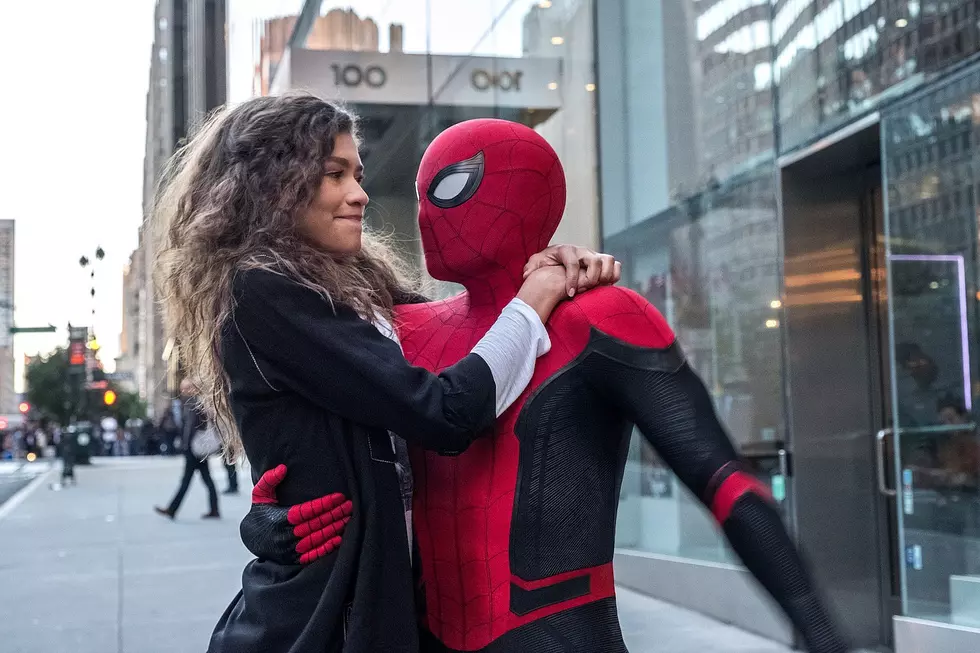
What If ‘Spider-Man: Far From Home’ Was The Last MCU Movie Ever?
The following post contains SPOILERS for Spider-Man: Far From Home.
At the end of Spider-Man: Far From Home, Peter Parker briefly gets everything he’s ever wanted. He and MJ become a couple, and the two get to enjoy a wild web-swing through Manhattan that starts just up the street from New York’s Grand Central Station.
Though they don’t remark upon it, Grand Central is a location heavy with symbolic meaning in the Marvel Cinematic Universe. In the MCU, Grand Central sits in the shadow of Stark Tower, ground zero of the alien invasion of Earth in The Avengers. In Far From Home, set many years later, the place is still under repair. Spidey and MJ begin their date in front of a temporary construction wall that reads “We are so excited to show you what comes next!”
The wall also includes the numbers 1, 2, and 3 with arrows connecting them. The arrow out of the big “3” leads to a circle with a question mark inside. The whole image is a big wink from Marvel to its fans. Spider-Man: Far From Home was the final film in Phase 3 of the Marvel Cinematic Universe, and the epilogue to “The Infinity Saga,” the comic-book company-turned-film-studio’s name for the sprawling, multi-pronged story contained in their first 23 films.
Far From Home was intended as the end of one very large chapter in Marvel’s history, followed by an even more ambitious onslaught of theatrical movies and TV shows streaming on Disney+. But then the first post-Infinity Saga movie, Black Widow, got delayed by the coronavirus pandemic. None of the Disney+ shows have an officially announced launch date.
As we sit approaching the one-year anniversary of Far From Home’s release, the future of Marvel’s cinematic universe remains as big of a question mark as the one on that wall by Grand Central Station. Supposedly The Falcon and The Winter Soldier will premiere in August. And I hope that the curve will flatten enough to allow Black Widow to open on November 6. Still, this is the longest stretch of time without a new Marvel movie in seven years; since the one-year break between 2012’s The Avengers and 2013’s Iron Man 3. And it’s not over yet.
Everyone seems to assume Black Widow will be out later this year, and then the MCU will resume its regular schedule. I’m skeptical. Either way, eventually the Marvel Cinematic Universe will get back on track. For now though, and maybe for quite a few months to come, Spider-Man: Far From Home is the last MCU movie. And since Marvel fans love What If...?s here’s a fun thought experiment to ponder: What if Far From Home was the last Marvel movie ever?
For one thing, it would be awfully anticlimactic. Avengers: Endgame feels far more epic and conclusive than the trivial Far From Home. Marvel Studios’ second live-action Spidey movie is entertaining, and it does dangle a couple of cliffhangers that could be picked up by more consequential movies down the line. But if you set out to make “the last Marvel movie ever,” Avengers: Endgame was the way to go out. Spider-Man: Far From Home feels less like an exclamation point than a very slow ellipsis.
That said, there are interesting echoes of the real world in the MCU circa the summer of 2019. Far From Home opens with a news report from the students of Midtown High School about “The Blip,” their nickname for the five years that half of the universe was snapped out of existence by Thanos in Avengers: Infinity War. The post-Endgame MCU is a confusing place. Those who were blipped — including Peter Parker (Tom Holland), MJ (Zendaya), and Ned (Jacob Batalon) — now look physically younger than those who didn’t.
The Midtown High video begins with a montage of dead heroes (set to Whitney Houston’s “I Will Always Love You”) that segues into the hosts’ description of how the Blip worked. “It’s been a long, dramatic, somewhat confusing road,” says Betty Brant (Angourie Rice). Then she adds “Its time to move on … to a new phase of our lives.” (Yes, the film is bookended by winks to the end of the MCU’s Phase Three and the Infinity Saga.)
While Peter Parker deals with some of the lingering financial and technological issues from Tony Stark’s death in Endgame — Tony leaves him an advanced A.I. program that becomes Far From Home’s MacGuffin — he and the rest of his Midtown High classmates barely grapple with the emotional and psychological fallout from the Blip. Peter isn’t traumatized by his death and rebirth, or for having missed the five years where half the universe’s population vanished. This supposed memorial video mostly treats the Blip like a big joke. It happened, it’s sort of weird that some former dorks are hunks now, and it sucks to have to repeat an entire school year. The end.
Last year, this struck me as a bit implausible. It seemed unlikely that half the universe could disappear and then reappear, and society would just act like nothing ever happened. In 2020, I look at videos of partying in the street in the East Village as if tens of thousands of people haven’t just died in New York City from coronavirus in the last three months and wonder ... maybe this was actually the most realistic part of this movie? (All the talk of moving into a new “phases” of life also eerily mirrors the language of pandemic reopenings.)
Admittedly, big chunks of Far From Home do not feel that timely. The basic premise is Spider-Man’s European Vacation. During his summer break from high school, Peter Parker and his pals are chaperoned on a science trip through Venice, Prague, and London that gets repeatedly interrupted by attacks from rampaging creatures known as “The Elementals.” At this point, the idea of taking a carefree jaunt through multiple foreign countries feels more fantastical than the idea of a guy wearing a fishbowl on his head fighting giant monsters from another universe.
The fishbowl guy is Mysterio, played by Jake Gyllenhaal. His costume is outlandish, as is the backstory he gives Peter Parker and superspy Nick Fury (Samuel L. Jackson): He claims to be from a parallel world that the Elementals already destroyed. In truth, he’s a con artist (and disgruntled Stark Industries employee) who uses drones and advanced imaging technology to create the illusion that he’s a superhero.
The movie doesn’t necessarily harp on the subtext of the Mysterio character; director Jon Watts is much more focused on the mechanics of his deception and Peter Parker debating whether or not to become the MCU’s next Iron Man. Still, that subtext is there, and it’s all about how a villain manipulates the media in order to gaslight the public as part of a wider plot to use the physical trappings of strength and leadership for personal profit while ignoring actual heroism’s accompanying responsibilities. To put it another way, Mysterio’s super-power is his ability to create and control fake news.
In the MCU, the guy controlling the illusions is soundly defeated. In our world, the struggle continues. Of course, that’s part of Marvel movies’ appeal; the villains often represent intractable societal problems that are handily defeated by the brave actions of the heroes. In escapist fiction, happy endings are never more than a couple of keystrokes away.
One of the hardest parts of the pandemic is there is no escape — at least not to movie theaters, which are still shuttered in most parts of the country, and the world. Almost every Marvel movie, borrowing from the classic formula of comic books, ends with a cliffhanger. The first Iron Man concluded with Tony Stark revealing his secret identity to a shocked audience; Spider-Man: Far From Home cuts to credits just as J. Jonah Jameson (J.K. Simmons) reveals Spider-Man’s secret identity to the entire world and accuses him of murder.
If Far From Home really was the final MCU movie, this echo of the original Iron Man would be a nice way for Marvel to bring its cinematic universe full circle. Previously, cliffhangers were a huge part of Marvel’s appeal; they left fans with something to think about and debate in between movies. Now that we don’t know when we’ll see the next MCU installment, they feel very different. I look at Spider-Man holding his head in his hands as his life is completely destroyed and feel less curiosity about what happens next than empathy for that sensation.
Gallery — The Weirdest Marvel Products You Can Buy:
More From 92.9 The Lake










